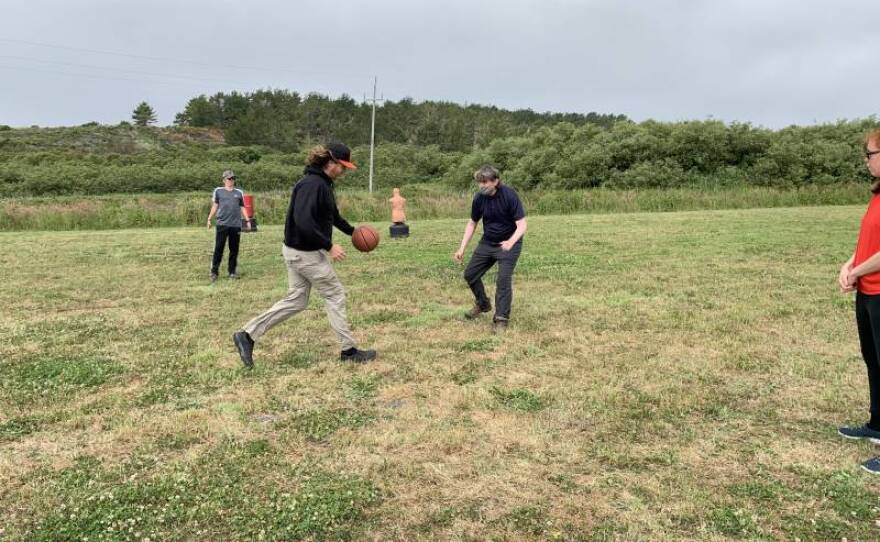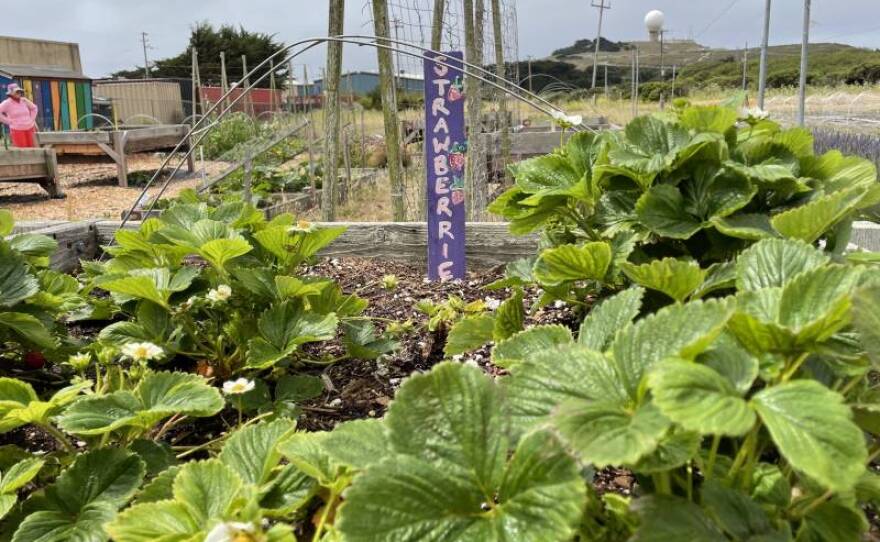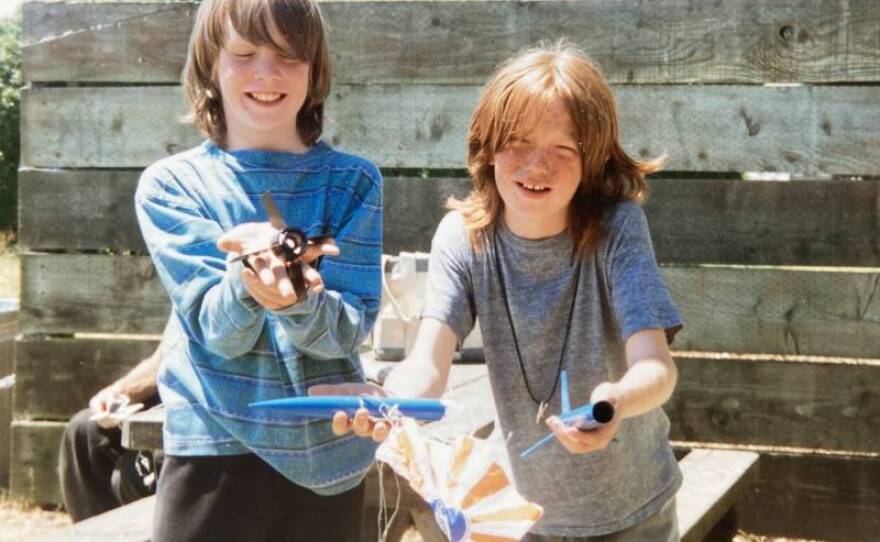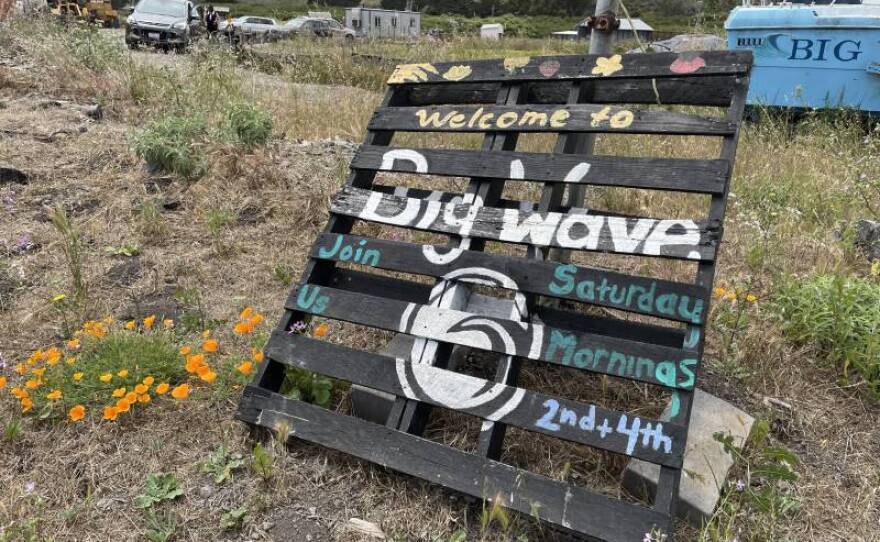For parents of children with intellectual and developmental disabilities, the fear of dying with no solid plan in place to care for their child runs deep.
“There's a clawing specter — that haunting, grinding specter — in your mind: What's going to happen when you pass?” said Jeff Peck, founder and CEO of the Big Wave Project, a parent-led community for their adult children in Half Moon Bay.
It all began two decades ago, with Special Olympics basketball teams that Peck and his son started in a small coastal community a half hour's drive south of San Francisco. Peck's daughter, Elizabeth, has emotional and intellectual disabilities.
"Humans are born to contribute to something greater than themselves. If a person only has a five-minute attention span and they can help for five minutes, that's awesome, right?! Because they feel like they're part of something."— Michelle Garcia Winner, speech language pathologist
Standing over six feet tall, silver hair under his baseball cap, Peck has an easy but direct way of coaching. Peck instructs a small group huddled around him to protect the ball, and then tells them: “When I say rebound … .” Everyone screams, “Rebound!” at the tops of their lungs.
The idea was for everyone to get a chance to hold the ball, to pass the ball, to aim for the backboard and generally, have a good time with each other. The Pecks started with seven basketball players; now there are around 60, on four teams.

“They started when they were eight. Some of them are thirty. Some of them started when they were 20. Now they're in their forties, but they keep coming back because that's the community which they created,” Peck said.
As families sat in the bleachers over the years, the parents began to wonder if these friendships could develop into something more permanent, a self-sustaining community of some kind.
“We have all different levels of ability on the basketball court and the higher, better players would help the lesser players, that's what this population is," said Big Wave Project board member Kim Gainza, and mother to Emmy, who will live at Big Wave. "They support each other and help each other, and if somebody makes a basket, everybody in the gym is cheering,”
Gainza summarized those conversations about the future:
"'Well, what's your plan for Joey when you're no longer here?’
‘Well, I don't know.’
‘What's your plan for Emmy when you're no longer here?’”
An idea takes root
In 1999, Peck bought a windy, grassy plot of land, about 20 acres, across from the Half Moon Bay Airport. At the time, he was mainly interested in providing a comfortable home for sports, and a little farming on the side.
There are rows of crops here: strawberries, peas, lettuce, squash and lavender. Colorfully-feathered chickens go about their business in a large coop. Big Wave sells fresh eggs, mainly to their families. To raise money, they also sell baskets of goodies from their garden — lavender products, flowers and eggs every second and fourth Saturday of the month.

Over the years, the parents' ambition for the place grew. Today, it includes plans for apartments, a community café staffed by residents, and office space to rent out for income. The idea is to provide a place where their adult children and other residents who join will soon be able to live independently, in a community of their peers.
“You want your child to be safe, but you want your child to have opportunity, a community. You want them to have a full life,” said Peck.
Creating an intentional community for adults with intellectual and developmental disabilities is no small feat. Peck did well for himself as a contractor, which allowed him to buy this land 20 years ago. But it’s taken numerous hearings and environmental reviews and permit applications to get to the point where Big Wave could break ground.
From the beginning, there were vociferous, local objections to the development. Sabrina Brennan, a former San Mateo County Harbor Commissioner who opposed the project, said the objections ran the gamut: from concerns about the property being in a tsunami inundation zone (later mitigated in consultation with the county) and too close to Fitzgerald Marine Reserve, to concerns Big Wave’s residents would be located too far away from social services.
Another major point of contention was Big Wave’s original proposal to build a large office park nearby, the proceeds of which would support the nonprofit, according to Big Wave Board member Kim Gainza. Big Wave eventually dropped those plans in order to obtain approval from the California Coastal Commission and San Mateo County for the mixed-use development now under construction (permits approved in 2018 and 2020). Loans, donations and grants will cover costs instead. Concerns raised in a lawsuit by a local sanitary district were settled in 2009.
In a statement, Big Wave spokesperson Sarah Sherwood wrote that Big Wave,“has been through years of examination and regulation, including the completion of an Environmental Impact Statement and full approval and permits from the California Coastal Commission (2015), which Big Wave supports, as it advocates for adults with disabilities, the environment and the natural beauty of the Coast.” She added, “100 percent of all profits from farm sales, and any mom and pop businesses on the property go directly to our nonprofit, to serve the needs of adults with developmental disabilities, such as (autism), Down’s (syndrome) and brain injuries.”
The green light finally came during the pandemic. Now 68 years old, Peck knows he’s got a limited window of time to establish something financially sustainable that can outlast him and the other original parents. “All of the revenue from these commercial assets go to keep the operating costs low,” said Peck.
A core group of families paid about $60,000 each for their adult child to have a place at Big Wave, although costs have risen with construction prices and county requirements, like a traffic light.
In addition to the 57 apartments where Elizabeth and other adults with intellectual and developmental disabilities will live, there’ll be office space for rent, with some tenants already slated, like a martial arts academy, a florist, a culinary academy and a public café. The café will be overseen by Julie and Paul Shenkman, who run the popular Sam’s Chowder House nearby. They’re parents, too, and their child Sam will live at Big Wave.
“It will be a breakfast-lunch café, it’ll be muffins and coffee and sandwiches and soups. It will provide a place for the kids to have a job,” Julie Shenkman said.
The model is kind of like a co-op, or an intentional community, a commune, with a board to run it all, with residents on it. Peck knows this is a big, expensive experiment.
“This is my life's work,” he said. “When you have children that look at the world differently, you get an insight into life and death and history and spirituality and wisdom that you wouldn't get otherwise.”
How adults with disabilities fall through the cracks
California's Department of Developmental Services serves more than 350,000 people with intellectual and developmental disabilities. It’s a sizable — and vulnerable — population.
The state is more generous than many others. But still, parents have to know how to work the system, according to Michelle Garcia Winner, a San Jose-based speech-language pathologist who’s worked with people on the autism spectrum for years.
She said there are plenty of programs for kids with intellectual and developmental disabilities (IDD), but things are less clear for parents of adult children.
“I don't ever see our government being able to manage the needs of adults, in a meaningful way,” Garcia Winner said.
Garcia Winner said overcoming isolation and finding purpose is very important for the IDD community, just as it is for the rest of us. “Humans are born to contribute to something greater than themselves. If a person only has a five-minute attention span and they can help for five minutes, that's awesome, right?! Because they feel like they're part of something.”
Dr. Lawrence Fung is an assistant professor of psychiatry and behavioral sciences at Stanford and the proud father of a neurodiverse teenager. He directs the Stanford Neurodiversity Project, which runs several programs including a specialized employment program for people with autism called Neurodiversity at Work. It pairs people on the autism spectrum with jobs well-suited to their specific skill sets.
"A lot of neurodiverse people have significant strengths that can contribute much to society, if they are discovered,” Fung said. he added that it's important for people like his son to be able to find work and build a strong sense of identity.
A tale of two brothers

Matthew Cadigan Hearn is in his mid-30s, six-foot-three, wavy brown hair, with black-rimmed glasses. He’s also just 11 months older than his brother Daniel, one of the family members who keeps a close eye on Matthew.
"Asperger's was the term ... that Matt was diagnosed with until they kind of changed it to being an autistic spectrum,” Daniel said. The two of them have been a part of the Big Wave Project for more than a decade. Daniel coaches the Cougars, one of four teams at Big Wave. “Some of them can't catch the ball thrown at full speed and some can,” he said.
“Matt is the big man on the court. He is there to get rebounds and blocks and hopefully throw the ball back up if he catches a rebound,” said Daniel.
When asked what position he likes to play, Matt said, “Due to my height, I was either a power forward or center, so I was having to get in the scrimmage and be a bit of a punching bag at times.” Matthew floats through the teams and is thinking about becoming a coach himself.
Daniel knows the fear of what could happen to his brother Matthew one day, if the brothers get separated, or worse, if Daniel dies. Matthew lives now with an uncle in South San Francisco, but those who don’t have family willing to step up can face grim alternatives, like group homes that can feel institutional.
Daniel said people like his brother shouldn’t be warehoused in grim assisted living facilities, as they often are in California. “What is schizophrenia? What is autism? What is Down's syndrome?” he asks. “These [are] things that affect the community and shouldn't be hidden away, you know? Something that's so public ... and accepting and welcoming [like Big Wave] is just so awesome,” he said.
Big Wave, Daniel said, has given Matthew an opportunity to explore and grow as a member of a community. “Matt has his own social circle here, and people asking for advice and him really just holding his own audience when talking to a group of people. It was cool to walk into a situation where it's not, ‘Oh, this is Daniel's brother.’ It's like, ‘No, I'm Matt's brother. This is his space.’”
Big Wave meets people where they are. It’s okay here for Matthew to work out issues he’s struggling with, without being condemned or dismissed or patronized, said Daniel. “He's started a bad habit of slapping his forehead when playing basketball, he'll miss a shot and get really angry and call himself ‘Stupid, stupid, stupid!’ And I'm like, ‘Where did that come from? Why are you doing that?’”

Daniel said he’s grateful to Matthew for teaching him more empathy and patience. But it's also important, Daniel said, that Matthew have a space where he gets to be the big brother. Matthew has training as a peer counselor, something he uses with this community.
“You know, if someone's having a bad day, he'll go over and chat with them,” Daniel said. “He'll usually take them aside or have that kind of conversation to see how they're doing and see how they're feeling and talk it out, help them kind of process what they're going through.”
The brothers share a lot of history, much of it traumatic. Their mother died of brain cancer in 2009. Daniel guides Matthew through the grief.
"He still feels that same kind of guilt, like ‘Oh, I wish I could have been more supportive of things’ and I just have to reinforce that ‘I feel the same way. You know, it's totally fine that you feel that way. And that just means that you're a good person.’”
Matthew gets philosophical when thinking about his mother. “Not that I’m a big religion-person, but I do like to think that some part of us that makes us unique does move on when our time here passes,” he said.
After their mother died, their father battled drinking and opioid addiction. He was eventually institutionalized. And then, he died.
“Matthew has similar guilt to my mom as my dad of, ‘oh, maybe I could have talked him out of drinking,’” Daniel said. “We did the best we could. And it's stuff we talk about, you know? Guilt is there. And it's okay to be guilty.”
Big Wave has been a critical solace and support to the brothers, and Daniel said he hopes to move into one of the planned caretaker apartments, to help his brother transition to independent living. He’s looking forward to helping Matthew do things like navigate his first fire drill, and cooking for himself.
What does Matthew Cadigan Hearn hope for, as he gets ready to move into Big Wave once construction is finished?
Copyright 2021 KQED. To see more, visit KQED.





